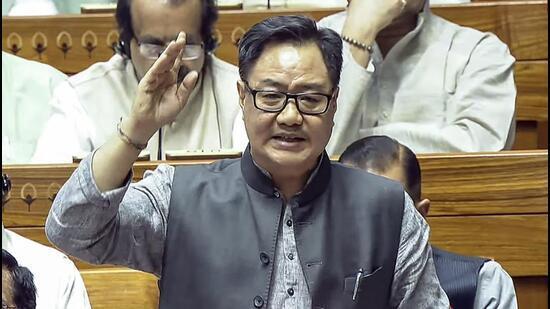
Opposition Creates Confusion & Leaves House: Rijiju in Rajya Sabha
The ongoing session of the Rajya Sabha witnessed a heated debate on the Waqf (Amendment) Bill, with Union Minister Kiren Rijiju criticizing senior opposition members for creating confusion and raising issues without staying back to listen to the replies. The minister’s remarks came during the discussion on the bill, which aims to amend the Waqf Act, 1995, to ensure the efficient administration of Waqf properties.
Rijiju’s comments were directed at senior opposition members, including Kapil Sibal, who had raised concerns over the bill. Sibal had compared the properties of Waqf bodies with those of other religious bodies, claiming that the bill was biased towards Muslims. However, Rijiju argued that Sibal’s comparison was baseless and created confusion among the members.
“We don’t want to create confusion, but some members want to create confusion and then leave the House,” Rijiju said, adding that the opposition was raising issues without staying back to listen to the replies. “This is not the way to conduct a debate,” he emphasized.
Rijiju’s statement was seen as a direct attack on Sibal, who had been vocal about his opposition to the bill. Sibal had claimed that the bill was designed to benefit only Muslims and that it would lead to the erosion of the rights of other religious communities. He had also questioned the government’s intention behind the bill, stating that it was an attempt to polarize the society.
However, Rijiju rejected Sibal’s claims, saying that the bill was aimed at ensuring the efficient administration of Waqf properties and providing a more transparent and accountable system. “We want to ensure that the Waqf properties are used for the benefit of the society and not for personal gain,” he said.
The debate on the Waqf (Amendment) Bill has been ongoing for several days, with opposition members raising concerns over various aspects of the bill. The bill seeks to amend the Waqf Act, 1995, to empower the Central Waqf Council to take over the administration of Waqf properties, which are managed by the state governments.
While the opposition has been critical of the bill, the government has defended it, saying that it is aimed at ensuring the efficient administration of Waqf properties and providing a more transparent and accountable system. The government has also argued that the bill is necessary to address the issues of corruption and mismanagement of Waqf properties, which have been plaguing the system for years.
In the wake of Rijiju’s statement, the opposition has accused the government of trying to suppress the debate and silence the voices of dissent. “The government is trying to gag the opposition and prevent us from raising our concerns,” said Sibal, adding that the bill was an attempt to polarize the society and divide the people.
However, Rijiju has maintained that the government is committed to ensuring a free and fair debate on the bill and that the opposition is free to raise their concerns. “We want to ensure that the debate is conducted in a peaceful and respectful manner,” he said.
The debate on the Waqf (Amendment) Bill is likely to continue in the coming days, with both sides refusing to back down. The outcome of the debate will have significant implications for the country’s Waqf properties and the rights of the religious communities.






